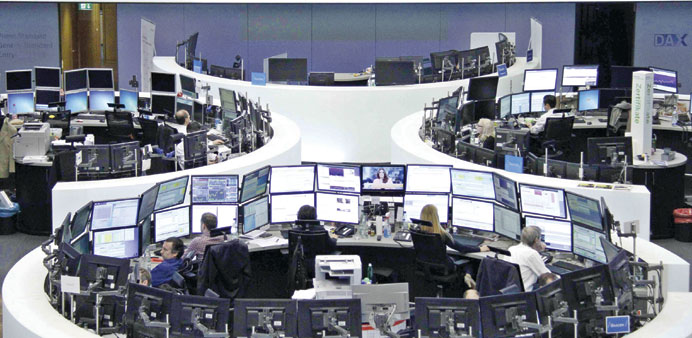Traders work at the stock exchange in Frankfurt. The DAX 30 closed down 1.05% at 11,351.46 points yesterday.
AFP/London
Europe’s main stock markets closed mixed yesterday, despite news of solid first quarter economic growth in the eurozone—with France outpacing powerhouse Germany—and encouraging company results.
After spending most of the day in positive territory, Paris’ benchmark CAC 40 index of leading French companies ended 0.26% lower at 4,961.86 points compared with Tuesday’s close. Frankfurt’s DAX 30 also closed down 1.05% at 11,351.46 points.
London’s FTSE 100 also lost much of its earlier momentum, but finished 0.23% up at 6,949.63 points, thanks in part to upbeat British unemployment data.
The euro strengthened to $1.1363 from $1.1213 late in New York on Tuesday on the positive economic news issuing from Europe and disappointing US retail sales figures for April.
US stocks were mostly weighted down by the same weak retail report, which spurred expectations the Federal Reserve may delay raising interest rates.
In mid-morning Wall Street trades, the Dow Jones Industrial Average was down 0.10% to 18,050.06 points.
The broad-based S&P 500 lost 0.29% to 2,099.12 points. By contrast, the tech-rich Nasdaq Composite Index inched up 0.09% to 4,980.77.
European equities had slumped on Tuesday as Athens warned it could run out of cash in two weeks with debt repayments looming, sparking renewed worries of a Greek euro exit.
Despite early rises yesterday on positive economic data from across the eurozone, markets later returned to fretting over news that Greece had again slid into recession, and moved into negative territory on the US retail figures.
“Investors were initially buoyed by the rate-hike delaying power of this retail miss, leading the US markets to slender gains, until disappointment set in and led to, well, slender losses,” said analyst Connor Campbell at trading firm Spreadex yesterday.
“Nowhere is the markets’ current erraticism better captured than in the eurozone. A strengthened euro, the product of the same strong data that had previously boosted the region’s indices, has caused the DAX to fall from significant gains to notable losses.”
Economic growth in the 19-nation eurozone strengthened to 0.4% in the first quarter, official EU data showed Wednesday, in line with expectations and up from 0.3% in the final three months of 2014.
Growth slowed in Germany, Europe’s biggest economy, to 0.3% in the same period, from 0.7%.
France was surprisingly the star performer, experiencing its strongest growth in nearly two years, with GDP expanding by 0.6% from zero% at the end of last year.
Striking a gloomier note, Greece plunged back into recession, defined as two quarters of successive economic contraction.
The Greek economy shrank by 0.2% in the first quarter of this year, after a 0.4% contraction late last year.
Greece’s return to recession coincided with renewed political uncertainty in the country and doubts over its multi-billion euro international bailout.
“While all attention on Greece has been focused on the prolonged negotiations with creditors, the economic data has taken a step backwards in 2015,” said FXTM analyst Jameel Ahmad.
“We are noticing that European economies are benefiting from a mixture of the ECB’s policies... and budgets being eased following the decline in the price of oil, but it is clear that Greece is being left behind.”
In Paris, shares in Bouygues soared to the top of the CAC 40 risers board after the French conglomerate reported a smaller-than-expected first-quarter net loss of €157mn ($176mn).
In reaction, Bouygues shares closed out 2.57% higher at €37.91.
Back in London, paper company Mondi saw its shares end the day a whopping 8.94% higher at 1,414 pence, after revealing that first-quarter operating profits jumped by almost a third.

